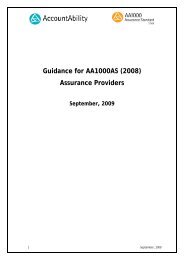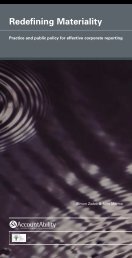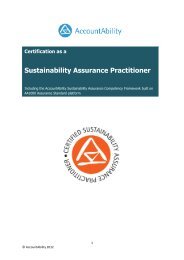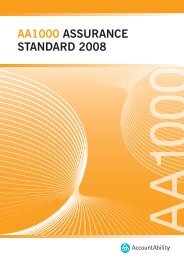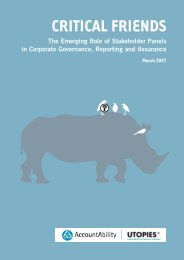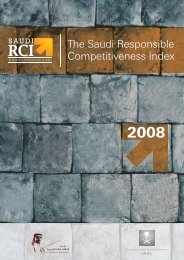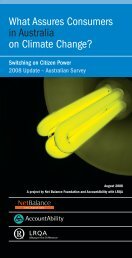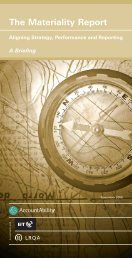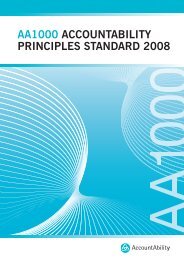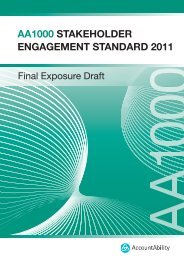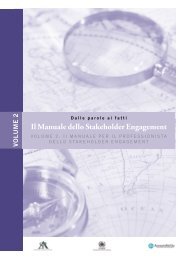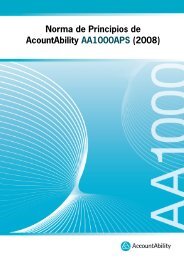The Stakeholder Engagement Manual Volume 2 - AccountAbility
The Stakeholder Engagement Manual Volume 2 - AccountAbility
The Stakeholder Engagement Manual Volume 2 - AccountAbility
Create successful ePaper yourself
Turn your PDF publications into a flip-book with our unique Google optimized e-Paper software.
Strengthen Capacities for <strong>Engagement</strong><br />
P12: DEVELOPING THE INTERNAL SKILLS AND CHARACTERISTICS NEEDED FOR STAKEHOLDER ENGAGEMENT<br />
<strong>Engagement</strong><br />
Techniques<br />
A knowledge of relevant approaches to<br />
stakeholder engagement is key (as<br />
outlined in Stage 4).<br />
<strong>The</strong> skill sets needed for more involved<br />
engagements such as partnerships,<br />
community relations development or<br />
confl ict resolution differ from more<br />
‘traditional’ and sometimes one-way<br />
market research techniques such as<br />
questionnaire surveys or focus groups, etc.<br />
<strong>The</strong>se are unlikely to rest with the<br />
same individual(s), and so may involve<br />
an integrated multi-disciplinary team from<br />
different functions within the organisation,<br />
e.g. human resources, public relations,<br />
customer affairs etc. (or drawing upon skills<br />
from outside as necessary).<br />
Issues Knowledge Expertise and experience in the specifi c<br />
issues that are subject of the engagement<br />
may be a pre-requisite for the staff<br />
involved. This could include both<br />
knowledge of sustainable development<br />
issues such as labour rights or climate<br />
change as well as an understanding of the<br />
industry and political context.<br />
Again, to engage on complex issues<br />
may require building a multi-disciplinary<br />
team that draws upon the ‘know-how’ of<br />
different departments, e.g. procurement,<br />
or environmental management, or<br />
drawing upon external expertise.<br />
Credibility<br />
<strong>Stakeholder</strong> <strong>Engagement</strong> Skills and Characteristics (continued)<br />
Success in securing trust and providing<br />
assurance to stakeholders may in part<br />
depend upon how well those involved in<br />
stakeholder engagement relate to and<br />
are perceived by a particular stakeholder<br />
group.<br />
Internal learning groups can ensure<br />
that those engaging with stakeholders<br />
in different parts of the business can<br />
contribute from each other’s<br />
experiences.<br />
Numerous service providers offer<br />
mentoring and support to build<br />
practitioner competencies, for example<br />
BSR and the Environment Council,<br />
see www.bsr.org or<br />
www.environment-council.org.uk<br />
respectively.<br />
<strong>AccountAbility</strong> has developed training,<br />
professional certifi cation (with IRCA)<br />
and quality standards in stakeholder<br />
engagement aligned with its AA1000<br />
Series. Further information available at<br />
www.accountability.org.uk/ training.<br />
<strong>The</strong> sources already identifi ed in Stage<br />
2 (learning from others), can be a useful<br />
reference. Establishing an issue-specifi c<br />
database that individuals from all<br />
parts of the business can access and<br />
draw information from is a useful<br />
resource for learning as needed.<br />
Again, numerous service providers offer<br />
advice and support to build practitioner<br />
competencies on specifi c issues (see the<br />
annex for some of these organisations).<br />
Credibility here may mean ensuring<br />
that people involved in engagement<br />
have a good understanding of the<br />
communities involved. In general,<br />
recruitment from local environments,<br />
which ensures equal opportunities<br />
regardless of gender, religion, ethnicity,<br />
sexual orientation etc., will help to ensure<br />
that staff inside the company refl ect the<br />
diversity of stakeholders.<br />
It may be necessary to involve external<br />
people or organisations in facilitating<br />
engagement processes. <strong>The</strong>y can<br />
provide credibility by being perceived as<br />
independent or because of their track<br />
record in contributing towards positive<br />
outcomes in the area.



